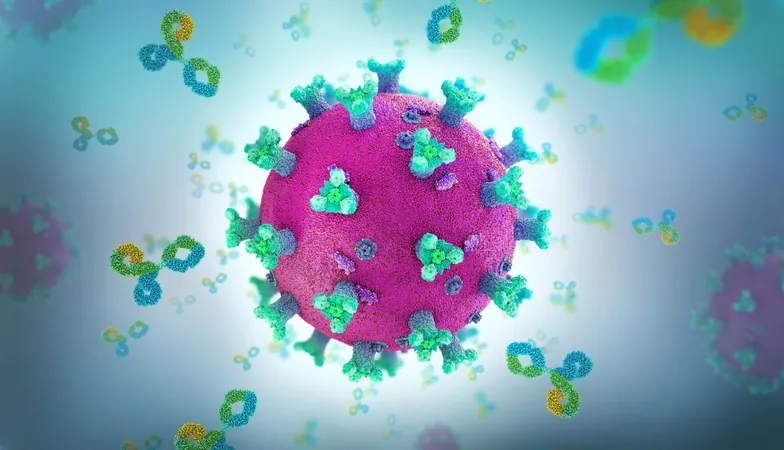
Shocking New Study Reveals COVID-19 Can Age Your Brain by 20 Years!
2024-09-25
Groundbreaking Study Reveals Alarming Cognitive Decline
A groundbreaking study conducted by researchers from the University of Liverpool, King’s College London, and the University of Cambridge has uncovered alarming evidence that COVID-19 can cause significant cognitive decline, effectively aging the brain by 20 years in just one year post-hospitalization. This extensive research analyzed over 350 patients who had been hospitalized due to severe COVID-19, and the results are both astonishing and concerning.
Evidence from MRI Scans and Blood Tests
Published in *Nature Medicine*, the study reveals that patients exhibited substantial cognitive deficits 12 to 18 months after recovery, marking a decline comparable to two decades of biological aging. MRI scans and blood tests revealed troubling markers of brain injury and a reduction in brain volume, illustrating the hidden toll that COVID-19 takes on our neurological health.
Cognitive Decline Observed Even Without Neurological Symptoms
Most shocking is the fact that this cognitive decline was evident even in patients who did not experience any neurological complications during their illness. Lead author Greta K. Wood emphasized, “These findings provide the clearest evidence to date that COVID-19 can have significant impacts on brain and mind health long after the respiratory symptoms resolve.” This suggests that the effects of the virus may extend beyond what was first understood, affecting mental faculties regardless of initial neurological issues.
Alarming Statistics and the Issue of 'Brain Fog'
The alarming statistics don’t end there. Researchers noted a disturbing trend among patients who endured long-term cognitive symptoms often referred to as “brain fog.” While many report these issues, until now there has been limited objective evidence of cognitive impairment or biological markers of brain injury. Wood noted the importance of understanding whether patients experience recovery over time, and the team's findings suggest that cognitive deficits can last much longer than previously assumed.
Immune-mediated Mechanisms and Brain Injury
The study points to potential immune-mediated mechanisms that may contribute to brain injury in those suffering from moderate to severe COVID-19. "COVID-19 is not just a respiratory disease. Patients most severely affected often also face cognitive challenges," stated Professor Benedict Michael, the study's corresponding author.
Pervasive Cognitive Deficits in Hospitalized Patients
The researchers’ data indicate that cognitive deficits were pervasive, even in those who did not have classic neurological diagnoses. There is a clear association between elevated brain cell injury markers in the blood and diminished brain volume, particularly in the anterior cingulate cortex, suggesting that the long-term effects of COVID-19 have measurable biological foundations.
Initial Symptoms and Tentative Recovery Trends
Among the 351 hospitalized COVID-19 patients, those with more intense initial symptoms exhibited the most significant cognitive impairments. Interestingly, follow-up assessments on a subset of 106 patients hinted at a tentative recovery trend, raising crucial questions about the potential for long-term improvement.
Call to Action for COVID-19 Survivors
As millions grapple with the fallout from COVID-19, this research highlights an urgent need for further understanding and therapeutic strategies to address the cognitive impacts of the virus. With the threat of enduring brain injury and cognitive decline looming large, this study underscores the importance of ongoing mental health monitoring for COVID-19 survivors.
Conclusion: TheImpact on Long-term Health
Will you be impacted too? The long-term effects of COVID-19 could threaten the mental well-being of countless survivors. Stay informed and prioritize your health!


 Brasil (PT)
Brasil (PT)
 Canada (EN)
Canada (EN)
 Chile (ES)
Chile (ES)
 España (ES)
España (ES)
 France (FR)
France (FR)
 Hong Kong (EN)
Hong Kong (EN)
 Italia (IT)
Italia (IT)
 日本 (JA)
日本 (JA)
 Magyarország (HU)
Magyarország (HU)
 Norge (NO)
Norge (NO)
 Polska (PL)
Polska (PL)
 Schweiz (DE)
Schweiz (DE)
 Singapore (EN)
Singapore (EN)
 Sverige (SV)
Sverige (SV)
 Suomi (FI)
Suomi (FI)
 Türkiye (TR)
Türkiye (TR)